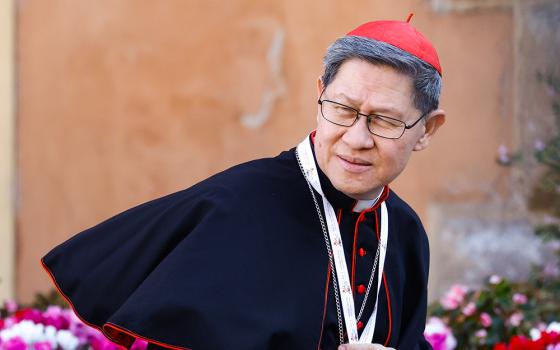Fr. John Stack, a priest of the Davenport Diocese, celebrated his reinstatement to active ministry with his first public Mass in 38 months on Father's Day, June 19, at the Clinton nursing home where his late father once resided.
A church trial outside the diocese found that accusations of clergy sexual abuse against Stack were not proved. The Vatican's Congregation for the Doctrine of Faith concurred with the trial judges' finding and Davenport Bishop Martin J. Amos announced Stack's reinstatement June 15.
"I just felt that the Lord and the Blessed Mother were always close to me. I felt God was telling me, 'you are a priest forever, in the line of Melchizedek,'" Stack told The Catholic Messenger, the diocesan newspaper. He can't reveal details about the accusations, but said he holds no animosity toward his accusers.
Stack recalls the day -- April 20, 2013 -- when he learned about accusations against him. The previous day, Cardinal Francis E. George of Chicago honored Stack and other alumni of the University of St. Mary of the Lake in Mundelein, Illinois, celebrating their 25th anniversary as priests.
"That day was one of the high points of my priesthood and the next day was the lowest point of my priesthood. I was absolutely stupefied learning of the accusations," he said.
Bishop Amos told Stack that the Davenport Diocese had received a report that the priest, then chaplain at Mercy Medical Center in Clinton, inappropriately touched minors in approximately the 1980s. The diocese reported the accusations to the Scott County Attorney in compliance with a memorandum of understanding between the diocese and the county attorney's office.
As required by canon law, Bishop Amos withdrew Stack from active ministry pending the outcome of an investigation. While that action is intended to protect children, an accused priest also is presumed innocent during the investigation, according to information on the U.S. Conference of Catholic Bishops' website.
Because he was forbidden by church law to act in any capacity as a priest during the investigation and subsequent trial, Stack said he felt as if he were considered guilty. Immediately, he had to excuse himself from Masses he had been scheduled to celebrate, including three weddings. "I had a full calendar, and the next minute, nothing."
Following the investigation, and with the recommendation of the Diocesan Review Board, Bishop Amos petitioned the Congregation for the Doctrine of the Faith to request the case be brought to trial, said Deacon David Montgomery, the diocese's spokesman.
A trial, under canon law, follows a different legal tradition than that of the United States. A panel of three judges hears the case. The accused cleric has a canon lawyer and the prosecutor serves as promoter of justice. Witnesses are called to testify, including possible victims. Other forms of evidence also are presented. The judges deliberate together and issue one of three verdicts: guilty, innocent or accusation not proved.
In Stack's case, the three judges, all from outside of the Diocese of Davenport, found the accusations of sexual abuse of minors made against him were not proved, Deacon Montgomery said. "There was not a finding of innocence or guilt. In order to assure the rights of all, the decision was appealed for further review. The Congregation for the Doctrine of the Faith concurred with the finding of the judges. After receiving the conclusion from the Vatican, Bishop Martin Amos will assign Stack to priestly ministry and service to the diocese."
Stack said that his 38 months away from ministry strengthened his calling to the chaplaincy and to ministering to people who enter long-term care. It humbled him.
----------------
Arland-Fye is editor of The Catholic Messenger, newspaper of the Diocese of Davenport.





